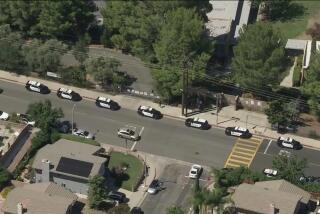Grappling With What to Tell Kids
- Share via
A sea of silvery Hershey’s kisses blanketed the large tables of Bathgate Elementary School’s multipurpose room Thursday.
About 50 parents and their children stuffed bag after bag full of chocolates. Despite the temptation, none of the youngsters indulged. They knew the care packages were bound for other students, hundreds of miles away, who had fallen victim to unspeakable violence.
Several parents sat alone. They wanted to help, but had decided to keep their children out of it.
In allowing the care packages for the students of Littleton, Colo., to be assembled at the Mission Viejo school during lunchtime, Bathgate administrators inadvertently stepped into a wider social debate: What should children be taught about controversial social issues such as school violence? When are kids old enough to grapple with the topic? And who should broach the topic with sensitive students--parents, teachers or both? As Bathgate administrators learned, there’s little consensus on the matter.
For most of the parents and kids who joined in, preparing the care packages was a cathartic response to last week’s Colorado school massacre that left a dozen students, a teacher and the two shooters dead.
“I think it makes them feel better,” said fourth-grader Brittany Smith, “because they’ve lost a lot of brothers and sisters, and that’s why I’m here.”
But the vast majority of parents--the school has about 800 students--chose not to let their kids take part, preferring to buffer their children, particularly those in kindergarten through third grade, from knowledge of the Littleton rampage. To protect their kids, these parents switched off TVs, kept newspapers hidden and hoped teachers wouldn’t bring the matter up.
Parent Jacki Smith showed up to help herself, but said she didn’t discuss the Littleton deaths with her children.
“I don’t even let my kids watch the news,” she said. “It’s too violent.”
Parent Julie Wilson tried to shield her daughter from the disturbing news.
“I wasn’t going to say anything until she asked me,” Wilson said. “I just told her some kids brought guns to school and some kids got injured.”
For their part, school administrators made the event, organized by parent Sheri Fitzgerald, a strictly extracurricular event. It wasn’t discussed with students, but parents were alerted via letter and given the option of participating. Teachers at the school were told that the subject of Littleton is taboo in classes.
“I’ve requested that teachers send the students back to discuss the issue with their parents or their priests,” Assistant Principal Anthony Bogle said.
In family rooms and classrooms around Orange County, educators, parents and child psychologists are struggling to decide whether the topic of school violence that has dominated public discourse is appropriate for kids.
There is general agreement that older children can and should discuss Littleton at school while younger pupils can handle simpler topics--such as what to do if you feel left out--if anything at all. No one condoned discussing graphic details with children.
When in doubt about discussing violence with kids, let their questions be your guide, said Marc Skelton, a Laguna Niguel child and adolescent psychologist.
“It could be premature if kids haven’t brought it up,” Skelton said. “The younger they are, the more you have to be concerned about an emotional safety zone, letting their natural insulation stay intact. . . . As soon as they indicate they’re ready, I would talk about it--and that could extend down into early elementary years. Lower than kindergarten and preschool, if they’re not aware, why intrude?”
Some take a different approach. At a Catholic school in Huntington Beach, the principal went on the campus’ in-house TV channel to address all kids, from kindergarten on up, about the shootings.
“I thought that was wonderful,” said parent Xiomara Galindo, whose 6- and 8-year-old children attend St. Bonaventure School. “They explained the situation for the students who hadn’t heard and then told them, ‘You are safe here. We all believe life is very important,’ ” Galindo said. “ ‘If you feel sad or confused, talk to us, talk to the teachers, talk to Mom and Dad.’ ”
In Ocean View elementary schools in Huntington Beach, teachers are playing it by ear, said Supt. James R. Tarwater. From fourth- or fifth-grade on up, the topic was discussed in current events lessons.
“At that age, it’s likely to come up,” he said. “And they talk about their responsibility as a class to take care of their peers and themselves. For younger kids, that can be very frightening--seeing all that on the TV. If a younger child wants to talk, we call the parents and see if they give permission for a school psychologist to talk to the child about it.”
Every teacher at Thurston Middle School in Laguna Beach has addressed the shooting with their classes, said Assistant Principal Chris Duddy. They’ve discussed cliques, conflict resolution and the prevalence of violence in movies, music and video games.
Several parents have thanked the school for talking about Littleton. None has complained.
“These students are very sophisticated,” Duddy said. “They watch the news. They know what took place. They know the ramifications of what these kids did. . . . At a middle school, kids are developing academically and socially. I think we need to discuss the social issues happening today.”
More to Read
Sign up for Essential California
The most important California stories and recommendations in your inbox every morning.
You may occasionally receive promotional content from the Los Angeles Times.












